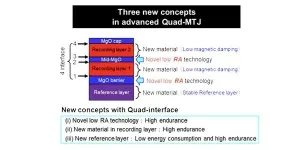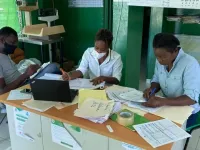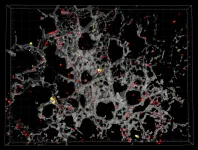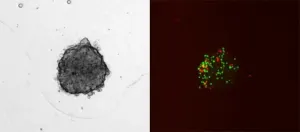(Press-News.org) As early as the Neolithic period (circa 3900 BC), the domestication of animals likely led to the development of diseases including measles and smallpox. Since then, zoonotic disease has led to other major transnational outbreaks including HIV, Ebola, SARS, MERS, and H1N1 swine flu, among others. Currently, more than half of all existing human pathogens, and almost three-quarters of emerging infectious diseases, are zoonotic in nature.
COVID-19 is the latest and most impactful zoonotic event of the modern era, but it will certainly not be the last.
Given the breadth of these impacts and the fact that other zoonotic pandemics are highly likely - a matter of when and not if - the key public health ethics question that emerges is about whether it is ethically appropriate for governments to intervene to prevent future pandemics. And given that SARS, Swine Flu, and the Spanish Flu of 1918 (among other outbreaks of zoonotic diseases) all came from animal agriculture facilities, a concern with preventing future pandemics suggests re-examining the current global food system - in the name of protecting public health.
In an article published in the journal Food Ethics, Florida Atlantic University's Justin Bernstein, Ph.D., senior author, an assistant professor in the Department of Philosophy within the Dorothy F. Schmidt College of Arts and Letters, and a member of the FAU Center for the Future Mind, which is sponsored by the FAU Brain Institute, and co-author Jan Dutkiewicz, Ph.D., a post-doctoral fellow at Concordia University, offer three plausible solutions to mitigate zoonotic risk associated with intensive animal agriculture. They explore incentivizing plant-based and cell-based animal source food alternatives through government subsidies, disincentivizing intensive animal source food production through the adoption of a "zoonotic tax," and eliminating intensive animal source food production through a total ban.
"Modern medicine has not only failed to catch up to the zoonotic threat, but in some ways is losing ground, due in part to growing global antibiotic resistance. So, from a public health ethics perspective, we should assess measures aimed at mitigating zoonotic risks," said Bernstein, whose expertise focuses on questions in moral and political philosophy and bioethics and the intersection of the two. "This is especially the case with systemic, predictable sources of zoonotic risk such as agriculture and food production. We argue that if the government may protect public health generally, then this permission extends to radically altering current animal agricultural practices."
The first, and arguably least intrusive public health intervention the authors offer, involves incentivizing alternative choices. Second, they suggest that public health disincentivizes the relevant behavior that poses a public health risk by attaching costs to it. Given that animal source food production can lead to the outbreak of zoonotic disease that can harm both consumers and non-consumers, the authors argue that the goal of disincentivizing both production and consumption could be achieved by a Pigouvian tax - a "zoonotic tax" - on meat.
The third and most intrusive kind of intervention involves the government restricting or eliminating choices. In the context of mitigating the risk of zoonotic pandemics, the authors say that governments might consider making intensive animal agriculture illegal. Of course, given the disruption to food supply chains and both local and national economies, such a ban would have to be carefully and gradually enacted.
"While there are urgent short-term public health measures that can mitigate the devastating effects of the COVID-19 pandemic, we must not lose sight of how to prevent the devastation of a future pandemic. In response to the current pandemic, a natural thought is to focus on what public health agencies and local governments should focus on contact tracing, more tests, social distancing and adequate personal protection equipment," said Bernstein. "Yet, while all of these approaches are invaluable, they are not truly preventative in that they do not address a root cause of future zoonotic risk: intensive animal agriculture."
The authors note that the threat of another pandemic may be the right kind of consideration to motivate people to seriously re-examine current dietary practices, especially when they have witnessed firsthand just how devastating a pandemic can be.
"The risk of infectious disease associated with animal agriculture is often overlooked. The COVID-19 pandemic forces us to pay attention to food production and evaluate how to reduce similar outbreaks in the future in the interest of global, collective public health," said Bernstein. "While the exact causes of this particular pandemic still require further investigation, we have highlighted the causal role of intensive animal agriculture in other pandemics and its contribution to increased risk of future zoonotic disease outbreaks."
INFORMATION:
About Florida Atlantic University:
Florida Atlantic University, established in 1961, officially opened its doors in 1964 as the fifth public university in Florida. Today, the University serves more than 30,000 undergraduate and graduate students across six campuses located along the southeast Florida coast. In recent years, the University has doubled its research expenditures and outpaced its peers in student achievement rates. Through the coexistence of access and excellence, FAU embodies an innovative model where traditional achievement gaps vanish. FAU is designated a Hispanic-serving institution, ranked as a top public university by U.S. News & World Report and a High Research Activity institution by the Carnegie Foundation for the Advancement of Teaching. For more information, visit http://www.fau.edu.
Doctors have hoped that antibiotics could benefit patients with chronic lung diseases, but a new study has found no benefit for patients with life-threatening idiopathic pulmonary fibrosis in preventing hospitalization or death.
While there were no statistical benefits for patients with the lung-scarring disease, the new research will prevent unnecessary antibiotic use that could contribute to the growing problem of antibiotic resistance. The nationwide clinical trial - believed to be the largest idiopathic pulmonary fibrosis trial ever conducted - also collected biological samples that will advance the understanding and treatment of the mysterious and ultimately fatal illness.
"We were certainly disappointed in the results. But we remain hopeful that in further downstream ...
(Carlisle, Pa.) -- A new study published in the American Journal of Lifestyle Medicine finds critical links between job loss and physical inactivity in young adults during the U.S. Great Recession of 2008-09 that can be crucial to understanding the role of adverse economic shocks on physical activity during the COVID-19 pandemic. It is the first study to examine how job losses during the Great Recession affected the physical activity of young adults in the United States.
The study by Dickinson College economist Shamma Alam and Harvard T. H. Chan School of Public Health economist Bijetri Bose looked at Panel Study of Income Dynamics (PSID) data for young adults age 18 to 27--a phase of development associated with maturation and significant ...
Professor Tetsuo Endoh's Group at Tohoku University's Center for Innovative Integrated Electronics has announced a new magnetic tunnel junction (MTJ) quad-technology that provides better endurance and reliable data retention - over 10 years - beyond the 1X nm generation.
This novel Quad technology meets the design requirements for the state-of-the-art X nm complementary metal-oxide semiconductor (CMOS) node and will pave the way for ultra-low-power consumption for Internet of Things (IoT) edge-devices in mobile communication, the automotive industry, consumer electronics, ...
Researchers from Telethon Kids Institute and Curtin University in Perth and Tulane University in New Orleans have developed sophisticated data modelling that could help eradicate malaria in Haiti.
Haiti is the poorest country in the Caribbean - beset by natural disasters - and is one of the few countries in the region that have not mostly wiped out the mosquito-borne disease.
Telethon Kids Institute researcher Associate Professor Ewan Cameron led the team, using a range of different health data to create a complete picture of where malaria infections are taking place in Haiti. This information has been used to directly inform Haiti's national response to malaria.
The team's findings ...
Treating patients with acute respiratory failure is a constant challenge in intensive care medicine. In most cases, the underlying cause is lung inflammation triggered by a bacterial infection or - more rarely, despite being frequently observed at present due to the corona pandemic - a viral infection. During the inflammation, cells of the immune system - the white blood cells - migrate to the lungs and fight the pathogens. At the same time, however, they also cause "collateral damage" in the lung tissue. If the inflammatory reaction is not resolved in time, this can result in chronic inflammation with permanent impairment of lung function. Together with colleagues from London, Madrid and Munich, a research team at the University ...
Researchers at the University of Eastern Finland have uncovered potential mechanisms by which microRNAs (miRNA) drive atherogenesis in a cell-type-specific manner. Published in the Arteriosclerosis, Thrombosis, and Vascular Biology journal, the study provides novel insight into the miRNA profiles of the main cell types involved in atherosclerosis.
Atherosclerosis is the underlying cause of most cardiovascular diseases and one of the leading causes of mortality in the world. During atherosclerosis, arteries become progressively narrow and thick due to the formation of plaques containing cholesterol deposits, calcium and cells, among other components. ...
Every tumour is different, every patient is different. So how do we know which treatment will work best for the patient and eradicate the cancer? In order to offer a personalised treatment that best suits the case being treated, a team of scientists led by the University of Geneva (UNIGE), Switzerland, had already developed a spheroidal reproduction of tumours that integrates the tumour cells, but also their microenvironment. However, the immune system had not yet been taken into account, even though it can either be strengthened or destroyed by the treatment given to the patient. Today, the Geneva team has succeeded in integrating two types of immune cells that come directly from the patient into the spheroidal structure, ...
The Permian Basin, located in western Texas and southeastern New Mexico, is the largest oil- and gas-producing region in the U.S. The oilfield operations emit methane, but quantifying the greenhouse gas is difficult because of the large area and the fact that many sources are intermittent emitters. Now, researchers reporting in ACS' Environmental Science & Technology Letters have conducted an extensive airborne campaign with imaging spectrometers and identified large methane sources across this area.
According to the U.S. Energy Information Administration, 38% of the nation's total oil and 17% of natural gas production took place in the Permian Basin in 2020. Therefore, quantifying emissions from these operations, which continue to expand rapidly, is ...
A healthy diet around the time of conception through the second trimester may reduce the risk of several common pregnancy complications, suggests a study by researchers at the National Institutes of Health. Expectant women in the study who scored high on any of three measures of healthy eating had lower risks for gestational diabetes, pregnancy-related blood pressure disorders and preterm birth. The study was conducted by Cuilin Zhang, M.D., Ph.D., and colleagues at NIH's Eunice Kennedy Shriver National Institute of Child Health and Human Development (NICHD). It appears in the American Journal of Clinical Nutrition. ...
A team of students working with Jonathan Boreyko, associate professor in mechanical engineering at Virginia Tech, has discovered the method ducks use to suspend water in their feathers while diving, allowing them to shake it out when surfacing. The discovery opens the door for applications in marine technology. Findings were published in ACS Applied Materials & Interfaces.
Boreyko has a well-established body of work in the area of fluid mechanics, including the invention of a fog harp and the use of contained, recirculated steam as a cooling device. As his research has progressed throughout the past decade, the mechanics of duck de-wetting has been one of his longest-running projects.
"I got this idea when I was at Duke University," ...







